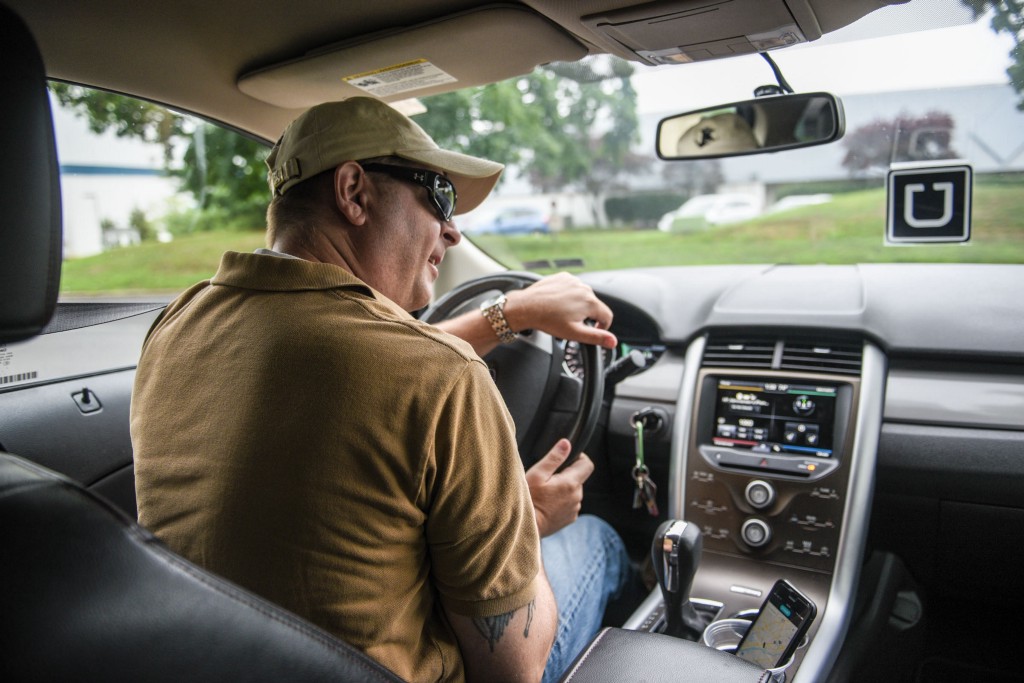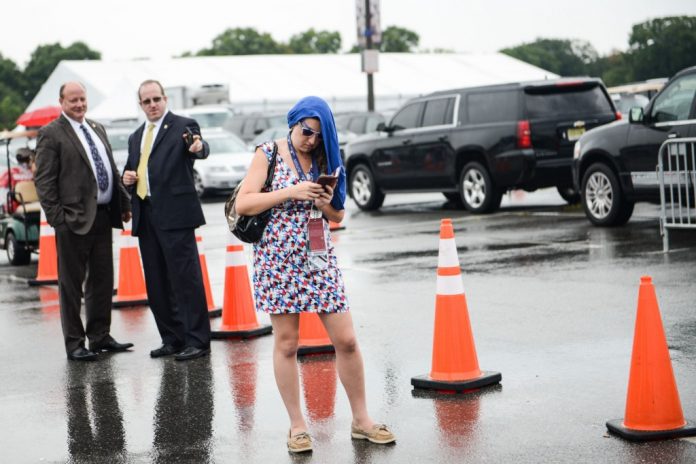Long delays: A woman waits in the rain for an Uber pick up during the Democratic National Convention in South Philadelphia. MARIA YOUNG / TIMES PHOTO
Hello, my name is Bill. And I’m an Uber driver.
For almost two years, I have patrolled the streets, avenues and boulevards of Philadelphia, transporting the city’s usually gregarious, often weary and sometimes drunk denizens and visitors from Point A to Point B.
Riders need not search for me. I have always been easily, yet discreetly accessible to anyone with a certain smartphone application. Yet, until very recently, I have been confined to a closet, fearful of expressing my true self publicly, lest I subject myself to the scorn of government regulators. I provide a valuable public service, albeit an illegal one.
— Bill the Uber driver
Bill the Uber driver’s dilemma changed early last month when the Philadelphia Parking Authority, which regulates cabs, limousines and rideshares in the city, announced that it would suspend its Uber ban for several weeks leading up to and including the Democratic National Convention. The cab and limo drivers were not happy, wary that Uber would undermine their own profits.
But with SEPTA’s regional rail system already compromised due to defective passenger trains, and with many conventioneers overnighting in Center City, miles away from the host arena in South Philly, the new Uber partnership, even if temporary, seemed to make sense.
And it gave Bill cause for celebration. He could now affix his “U” logo sticker on the rear window of his car, and he could wear it proudly.
But Bill’s hopes were dashed after only two nights of the four-night convention as poorly managed (or perhaps unmanageable) vehicle traffic left him and untold hundreds of Uber drivers idling in gridlock on the approach to the arena complex while countless would-be riders waited indefinitely and frustratingly at the lone Uber queueing station.
Bill is 45 years old. He’s been going to the stadiums since he was a kid, even had Eagles season tickets for a dozen years or so. But he had never seen anything such as Tuesday night outside the DNC. Usually, there’s one-way traffic at major events. Beforehand, patrons arrive and park. Afterward, they return to their vehicles and depart. But for the DNC, organizers thought it would be a good idea to attract a ton of cars into an area at the same time thousands more were trying to leave.
Bill lived to recount the chaos. His 7-hour night shift that night had several highlights, such as a 36-minute drive with MSNBC foreign affairs contributor Steve Clemons. Bill learned that Clemons ran on the track team at UCLA, had jogged eight miles around Philly that morning and is a close friend of Hardball host and Somerton native Chris Matthews.
But Bill’s night will long be remembered more for disaster. As Bill Clinton was wrapping up his keynote address, Bill the Uber driver wanted to take advantage of the rush of conventioneers exiting the Wells Fargo Center. Clinton was surging on stage while Uber was “surging” outside. Demand was high and so were Uber’s rates. It should have been prime time, earnings-wise.
Bill made it to 10th Street near Ritner shortly after 11 p.m. when a rider requested a pick up in the designated Uber lot next to the Phillies’ ballpark, across Pattison Avenue from the convention venue. Bill was still five blocks north of the outermost Uber checkpoint at 10th and Bigler and much farther from the pick up spot. Traffic was at a near standstill. Typically, the Uber dispatch system automatically connects riders to the closest available car. So Bill thought it odd that he would get a request from so far away.
For unknown reasons, that rider canceled less than a minute later. Bill accepted another request at 11:10, but that rider canceled, too. At 11:11, a third rider requested a pick up. He politely texted Bill, asking how long it might take his car to arrive. Bill replied, “Sorry. I really don’t know.” The rider responded, “No worries.”
As Bill got closer to Bigler Street, the true severity of the fiasco dawned on him. SEPTA buses, taxi cabs, limousines and general traffic were all packed onto South 10th Street, which is marked for one lane in each direction but seems to have room for two cars to travel abreast each way. And in the case of some aggressive cab drivers, three abreast.
One cabbie passed a long line of cars on the left, then cut in just ahead of a bus. Another hack passed on the right, between the traffic and a row of cars parked along the curb. As that second cab driver stopped next to Bill, the two exchanged profanities. The cabbie made a few ugly hand gestures. Bill ultimately got out of his way.
Bill inched southbound on 10th Street for about a half-hour. He still wasn’t inside the parking lot. Without warning, his would-be rider canceled the pick up request, leaving Bill with no fare, no escape and no prospects for the foreseeable future. There was no way to turn around, so he had to press forward.
Inside the lot, dozens of conventioneers in business suits, dress shoes, skirts and high heels were trudging across the acres of empty parking spaces in a futile search for their long-delayed Ubers. Tensions among the drivers boiled over, too. DNC volunteers were positioned at key merging points to direct traffic. They allowed one line of cars to proceed steadily while keeping another line at a standstill. Bill screamed from his car window, “How about taking turns?!” A woman driver exited her car and confronted a security guard, exclaiming “We’ve got to get home, too!”
Eventually, thanks to a small gap in the litany of cars, Bill cut between some traffic cones and made a break for the exit. He never got close to the Uber pick up location. It took another half-hour for him to get back out onto 10th Street and headed north.
Despite the aborted rides, Bill’s night wasn’t a total loss financially. He collected about $105 in fares, from which he pocketed about $79 after Uber took its 25 percent cut. Those earnings were a far cry from the $25 an hour that Uber claimed its drivers had made on the first day of the DNC.
Bill’s personal costs included gas (about 80 miles worth) and the wear on his vehicle. But Pennsylvania allows him to deduct 54 cents per mile (about $43) on his income tax return. In the end, he probably netted about 55 bucks, plenty of money for dinner.
It was already beyond midnight, so he decided to stop for a Geno’s steak, “American wit.” ••

The not-so-fast lane: Bill the Uber driver discusses his experience working during the Democratic National Convention. MARIA YOUNG / TIMES PHOTO





